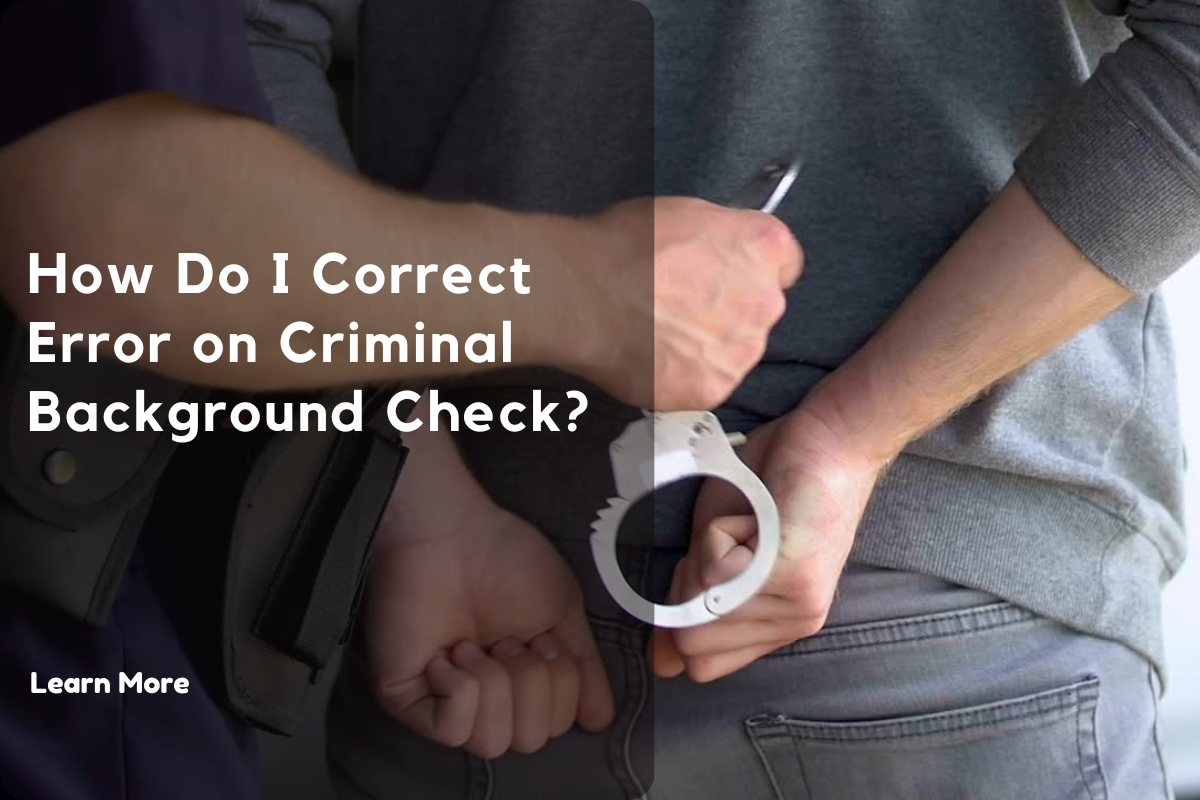 Understanding Errors in Criminal Background Checks
Understanding Errors in Criminal Background Checks
Introduction
Criminal background checks are critical tools for employers, landlords, and various organizations to evaluate an individual’s history and ensure they make informed decisions. These checks serve to promote safety, trust, and accountability. However, when errors occur in these reports, they can lead to severe consequences, such as job rejections, housing denials, and damage to personal reputation. It’s crucial to understand the types of errors that can arise, their causes, and the potential impact they have on individuals.
Common Types of Errors in Criminal Background Checks
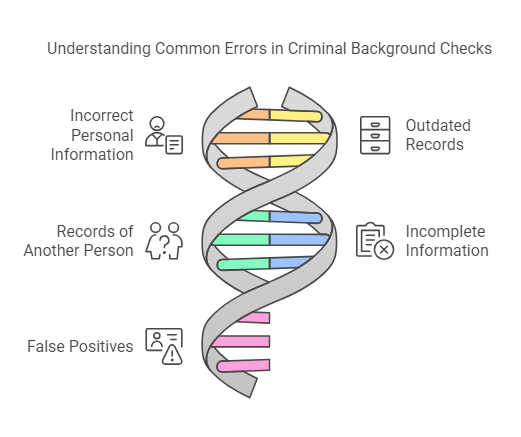
1. Incorrect Personal Information
One of the most frequent errors in criminal background checks is incorrect personal information. This can include misspelled names, wrong dates of birth, or inaccurate Social Security numbers. These errors typically occur during data entry, where a small mistake, such as a typo, can result in significant discrepancies. For example, a person might be mistakenly identified as having a criminal record due to an error in their date of birth.
2. Outdated Records
Another prevalent issue is outdated records. Criminal background databases should be regularly updated to reflect the most current information. However, in many cases, they contain outdated data, such as charges that have been dismissed or records that have been expunged. If these updates are not made promptly, old or irrelevant records can appear in a person’s background check, misleading potential employers or landlords.
3. Records of Another Person
Identity mix-ups are a significant source of errors, especially for individuals with common names. In these cases, someone else’s criminal record might mistakenly appear on an individual’s background check due to insufficient verification processes. This can happen when background check services rely on basic identifiers such as names and dates of birth, which can easily lead to confusion.
4. Incomplete Information
Incomplete information is another common issue in criminal background checks. Sometimes, the report might not capture the full details of a case, such as the final disposition or outcome of charges. This can result in a misleading representation of an individual’s criminal history, potentially suggesting ongoing or unresolved legal issues when none exist.
5. False Positives
False positives occur when an individual is incorrectly flagged as having a criminal record. This error can stem from problems in data matching or the misinterpretation of similar names and identifiers. False positives can have serious implications, as they may lead to unjust job rejections, housing denials, or other adverse outcomes.
How These Errors Occur
Data Entry Errors
A significant portion of errors in criminal background checks originates from data entry mistakes. Human errors during the entry of personal information into databases can result in inaccurate records. For instance, a clerical worker might accidentally input the wrong Social Security number or misspell a name, leading to incorrect or incomplete background reports.
Outdated Databases
Criminal background checks often rely on public records from government databases. However, these databases are not always updated in real-time, leading to outdated or incorrect information being reported. For example, an individual might have had their record expunged or a charge dismissed, but if the database has not been updated, this information could still appear on a background check.
Identity Confusion
Identity confusion is a common problem, particularly for individuals with common names or similar personal details. Without stringent verification processes, background check services might mistakenly attribute records to the wrong person. This is especially problematic in cases where only basic identifiers are used to compile reports, increasing the likelihood of identity mix-ups.
Inconsistent Reporting Standards
Different jurisdictions have varying standards for updating and maintaining criminal records. This inconsistency can lead to discrepancies in the information reported on background checks. Some jurisdictions might update records promptly, while others may have significant delays, resulting in outdated or incomplete information being used.
Third-Party Errors
Many organizations outsource the task of conducting background checks to third-party companies. While these companies provide valuable services, they may not always follow strict protocols for ensuring data accuracy. In some cases, third-party providers may cut corners to expedite the process, increasing the likelihood of errors in the final report.
Impact of Errors in Criminal Background Checks
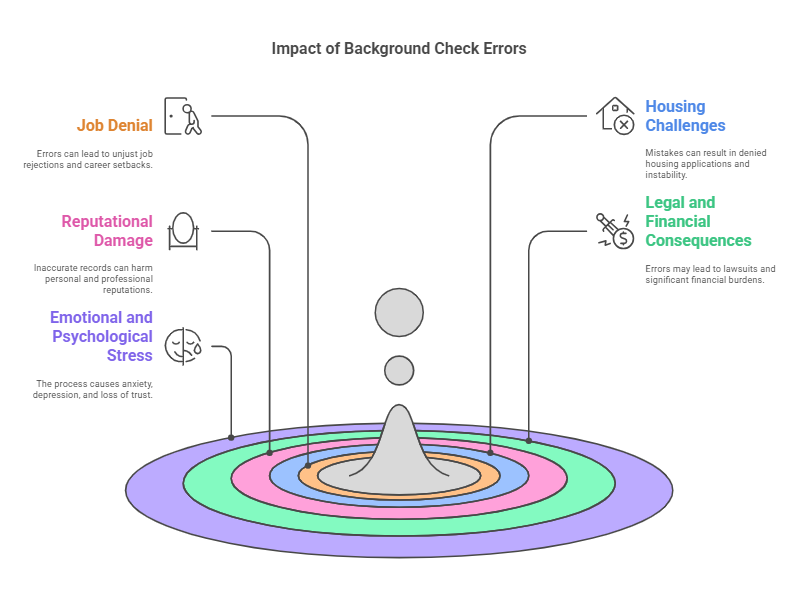
Job Denial and Career Impact
Errors in criminal background checks can have devastating effects on an individual’s career. Employers often rely heavily on these checks to make hiring decisions. An inaccurate report can result in a qualified candidate being unjustly disqualified from a job opportunity. This can lead to long-term career setbacks, financial instability, and difficulty finding future employment.
Housing Challenges
Housing is another critical area where background check errors can have serious consequences. Landlords frequently use these checks as part of their tenant screening process. An error, such as the inclusion of an outdated or incorrect criminal record, can lead to the denial of a housing application. This can prevent individuals from securing stable and affordable housing, which is particularly problematic for those already facing financial or personal challenges.
Reputational Damage
The presence of inaccurate criminal records can severely damage an individual’s reputation. Even if the errors are eventually corrected, the initial damage can have lasting effects on personal and professional relationships. The stigma associated with a criminal record, even if it is incorrect, can be difficult to overcome and may affect social interactions and community standing.
Legal and Financial Consequences
In some cases, errors in criminal background checks can lead to legal disputes. For instance, wrongful termination or denial of services based on incorrect information may result in lawsuits. Individuals may incur significant costs in the process of correcting these errors, including legal fees and lost income. Additionally, the time and effort required to resolve these issues can be considerable, leading to further stress and financial strain.
Emotional and Psychological Stress
Dealing with errors in a criminal background check can be an emotionally taxing experience. The stress of being wrongfully associated with criminal activity can lead to feelings of anxiety, depression, and helplessness. The process of correcting these errors can be time-consuming and frustrating, adding to the emotional toll. Individuals affected by these mistakes may experience a loss of trust in the systems designed to protect them and ensure fair treatment.
Steps to Correct Errors on a Criminal Background Check
Criminal background checks are integral in various life aspects, from securing employment to renting a home. However, errors in these reports can have serious consequences, leading to unjust denials or reputational damage. Correcting these errors is essential to ensuring that individuals are not unfairly judged based on inaccurate information. This guide outlines the detailed steps you can take to correct errors on a criminal background check, providing clarity and actionable advice for navigating the correction process effectively.
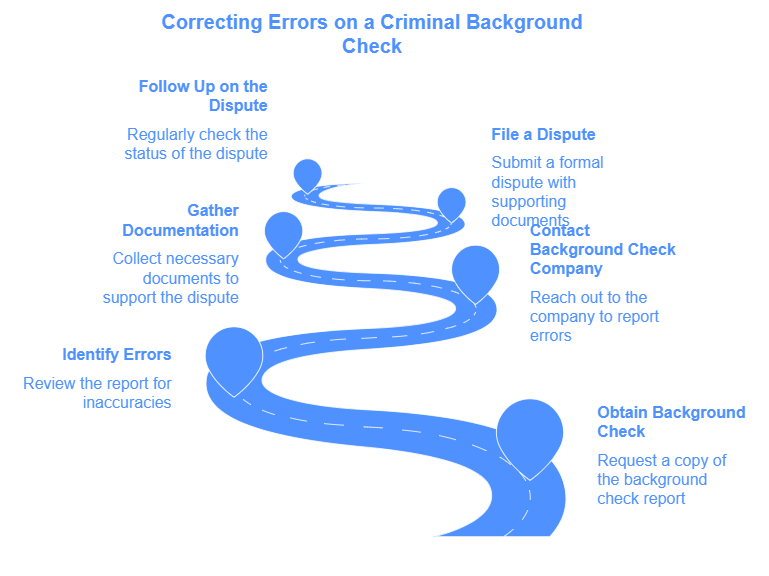
Step-by-Step Process for Correcting Errors
1. Obtain a Copy of the Background Check
The first step in correcting errors on a criminal background check is to obtain a copy of the report. You can typically request this from the employer, landlord, or organization that conducted the check. If they used a third-party background check company, they should provide you with the company’s contact information, allowing you to request the report directly. Having a copy of the report is crucial, as it enables you to identify specific errors and understand the extent of the inaccuracies.
2. Identify the Errors
Once you have the report, review it thoroughly. Look for any discrepancies or inaccuracies in the following areas:
- Personal Information: Check that your name, date of birth, and Social Security number are correct.
- Criminal Records: Ensure that all criminal records listed are accurate and relevant. Look for outdated information, records that have been expunged, or charges that were dismissed.
- Identity Errors: Verify that no other person’s criminal records have been mistakenly attributed to you.
Carefully noting each error will help you clearly communicate the issues to the background check company.
3. Contact the Background Check Company
After identifying the errors, contact the background check company responsible for compiling the report. Most companies have specific procedures for addressing disputes. You can usually find this information on their website or by calling their customer service line. When contacting them:
- Clearly explain the errors you found.
- Provide any necessary details to help them locate your report.
- Ask about their dispute process and any required documentation.
4. Gather Necessary Documentation
Supporting your dispute with proper documentation is crucial. Depending on the nature of the errors, you may need:
- Court Documents: If a charge was dismissed or expunged, provide official court records that verify this.
- Proof of Identity: Submit copies of government-issued identification to confirm your identity.
- Correspondence Regarding Identity Theft: If you suspect identity theft, include any police reports or correspondence that support your claim.
- Additional Legal Documents: Any other relevant documents that can help clarify the discrepancies.
Having these documents ready will streamline the dispute process and increase the chances of a swift resolution.
5. File a Dispute
With your documentation in hand, proceed to file a formal dispute with the background check company. Most companies require disputes to be submitted in writing, either through an online portal, via email, or by mail. Ensure your dispute includes:
- A clear description of the errors.
- Copies of all supporting documentation.
- Your contact information for follow-up.
Keep a copy of the dispute and all submitted documents for your records.
6. Follow Up on the Dispute
Once you’ve filed the dispute, it’s essential to follow up regularly. According to the Fair Credit Reporting Act (FCRA), background check companies must investigate and resolve disputes within 30 days. However, it’s a good idea to stay in touch to ensure your case is progressing. Regular follow-ups show the company that you’re serious about resolving the issue and help you stay informed about any additional information they might need.
7. Notify the Original Requester
After the dispute is resolved and the errors are corrected, inform the employer, landlord, or organization that requested the background check. Provide them with the updated report and explain the corrections made. This step ensures that they have the accurate information needed to reconsider their decision, whether it’s related to a job offer, housing application, or another matter.
Importance of Documenting the Process
Documenting every step of the correction process is vital for several reasons:
- Proof of Effort: Keeping detailed records of your communications and submissions demonstrates your proactive approach to resolving the errors.
- Legal Protection: Should the issue escalate to a legal dispute, your documentation can serve as evidence of your efforts to correct the inaccuracies.
- Personal Reference: Maintaining a record of your actions helps you track the progress of your dispute and provides a reference if similar issues arise in the future.
Role of Rapid Hire Solutions
Rapid Hire Solutions is a company dedicated to assisting individuals and employers in resolving errors in background checks. Their services include:
- Comprehensive Background Review: They conduct thorough reviews of background reports to identify and address inaccuracies.
- Dispute Assistance: Rapid Hire Solutions guides individuals through the dispute process, ensuring all necessary steps and documentation are completed accurately.
- Follow-Up Support: They offer follow-up services to ensure that disputes are resolved within the required timeframe, providing peace of mind throughout the process.
- Employer Support: For employers, Rapid Hire Solutions helps verify the accuracy of background checks for job candidates, minimizing the risk of legal issues stemming from incorrect information.
Summary of Steps to Correct Errors
To ensure clarity, here’s a summary of the steps involved in correcting errors on a criminal background check:
| Step | Action |
|---|---|
| 1. Obtain a Copy | Request a copy of the background check report from the relevant party. |
| 2. Identify Errors | Review the report for inaccuracies in personal details, criminal records, etc. |
| 3. Contact the Company | Reach out to the background check company to report the identified errors. |
| 4. Gather Documentation | Collect necessary documents such as court records, ID, and any related correspondence. |
| 5. File a Dispute | Submit a formal dispute with the background check company, including all supporting documents. |
| 6. Follow Up | Regularly follow up to ensure the dispute is being investigated and resolved. |
| 7. Notify the Requester | Inform the employer or organization that requested the check about the corrections. |
By following these steps and leveraging resources like Rapid Hire Solutions, you can effectively correct errors in your criminal background check, protecting your reputation and ensuring fair treatment in personal and professional endeavors.
Legal Aspects, FAQs, and Conclusion
Introduction
Understanding the legal framework surrounding the correction of errors in criminal background checks is essential for ensuring your rights are protected. Laws like the Fair Credit Reporting Act (FCRA) provide individuals with mechanisms to dispute and correct inaccurate information. This part covers the legal aspects of correcting errors, answers frequently asked questions, and offers a comprehensive conclusion summarizing the key points.
Legal Aspects of Correcting Errors
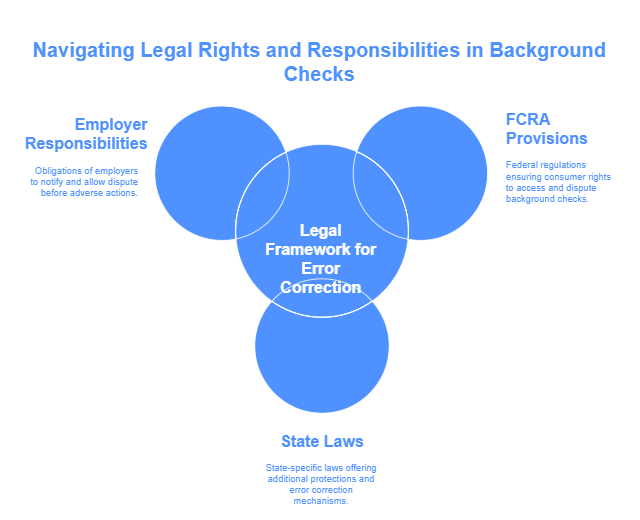
1. Fair Credit Reporting Act (FCRA)
The FCRA is a federal law that regulates the collection, dissemination, and use of consumer information, including criminal background checks. Key provisions of the FCRA related to background check errors include:
- Right to Access: Individuals have the right to request a copy of their background check report.
- Right to Dispute: If there are inaccuracies, you have the right to dispute the information with the background check company.
- Timely Resolution: The company must investigate the dispute and resolve it within 30 days.
- Notification of Results: After the investigation, the company must provide you with the results and a new report if changes were made.
2. State Laws
In addition to the FCRA, many states have laws that provide additional protections for individuals. These laws may vary but often include provisions for the correction of errors, expungement of certain records, and rights to privacy. It’s important to familiarize yourself with your state’s specific regulations.
3. Employer Responsibilities
Employers using background checks for hiring decisions have responsibilities under the FCRA, including:
- Pre-Adverse Action Notice: If an employer is considering taking adverse action (e.g., not hiring) based on a background check, they must notify you and provide a copy of the report.
- Opportunity to Dispute: You must be given the opportunity to dispute the information before the employer makes a final decision.
- Adverse Action Notice: If the employer decides to take adverse action, they must provide you with an adverse action notice, including information about your rights to dispute inaccuracies.
Frequently Asked Questions (FAQs)
What should I do if I find an error on my background check?
If you find an error, the first step is to obtain a copy of the report and identify the inaccuracies. Then, contact the background check company, file a dispute with supporting documentation, and follow up to ensure the error is corrected.
How long does it take to correct an error?
Under the FCRA, background check companies are required to investigate and resolve disputes within 30 days. However, the process may vary depending on the complexity of the error and the responsiveness of the company.
Can I sue for damages if an error on my background check caused me harm?
Yes, if an error on your background check led to significant harm, such as job denial or reputational damage, you may have grounds to sue for damages. Consult with a legal professional to explore your options.
How can I prevent errors on my background check?
While you can’t control all factors, you can take proactive steps such as monitoring your credit report, regularly checking public records, and promptly addressing any identity theft issues to minimize the risk of errors.
What if the background check company refuses to correct the error?
If the background check company refuses to correct an error, you can file a complaint with the Consumer Financial Protection Bureau (CFPB) or consult with an attorney to explore further legal action.
Conclusion
Accurate criminal background checks are essential for both individuals and employers, ensuring fair treatment in personal and professional contexts. Errors in these reports can lead to significant consequences, making it crucial to understand the steps to correct them. This guide has provided a comprehensive overview of how to identify and correct errors, the legal protections available, and practical advice for navigating the dispute process.
By being proactive, understanding your rights under laws like the FCRA, and following the outlined steps, you can effectively address inaccuracies and safeguard your opportunities. For employers, ensuring accurate background checks helps maintain compliance with legal standards and fosters fair hiring practices. Taking these measures benefits all parties involved, promoting trust and integrity in the background screening process.
